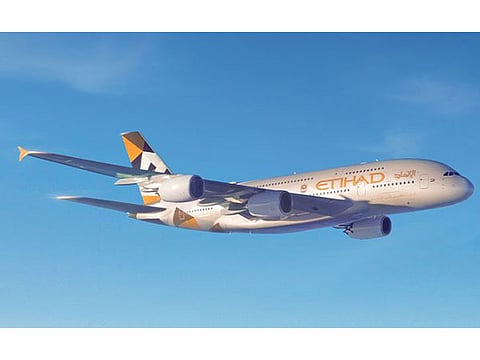No ‘favouritism’ for Etihad in Abu Dhabi, says CEO Antonoaldo Neves
The CEO said Etihad had to fight to secure traffic rights for markets like India

Abu Dhabi: The CEO of UAE’s national carrier has dismissed the notion that Etihad Airways receives any preferential treatment or subsidies, asserting that the competitive landscape in Abu Dhabi is fair and open to all airlines.
“I can tell you that Etihad today has no subsidies. We pay (for) fuel in Abu Dhabi at the market price. Etihad today is not actually favoured whatsoever,” the airline’s chief executive, Antonoaldo Neves, told Gulf News in response to questions about Wizz Air CEO Jozef Varadi’s comments to British news outlet The Telegraph.
Varadi alleged that the airline’s decision to quit the Middle East was triggered by a row with its Abu Dhabi government partner over “favouritism” shown to the Gulf state’s airline.
The ultra-low-cost airline suspended all flights from its Abu Dhabi hub last week, citing that the move was also driven by alleged curbs imposed on its local division by the Abu Dhabi authorities. These allegedly included a refusal to let Wizz Air Abu Dhabi fly to India and Pakistan as previously agreed, despite the two countries having granted it access rights.
Etihad Airways is wholly owned by the government of Abu Dhabi, through its sovereign wealth fund, ADQ.
Wizz Air Abu Dhabi was a joint venture between Wizz Air Holdings (which owned 49 per cent) and ADQ, which held a 51 per cent stake. Wizz Air refused any further comments to Gulf News on this matter.
Fierce competition in Abu Dhabi
While choosing not to directly address his colleague’s specific remarks, Neves, drawing on his extensive experience leading airlines in Brazil and Europe, pivoted to discuss the broader competitive environment in Abu Dhabi. “I can comment that from the perspective of someone who has been the CEO of an airline in Brazil, the CEO of an airline in Europe, and I have a good, fair understanding of how the different markets operate," said Neves.
He pointed to the fierce competition for slots to operate in Abu Dhabi as a prime example of a level playing field. “I mean, the competition that I have with airlines from India that are flying into Abu Dhabi is really fierce. We fight for slots in the airport,” he said, adding that people sometimes confuse these slots with traffic rights.
Airline slots are specific, pre-defined periods allocated to airlines for landing and takeoff at congested airports. Meanwhile, traffic rights refer to the permission for an airline to operate services between specific countries or regions.
“If you go to the peak time in Abu Dhabi today, on primary slots, right at 2 am, we have Air India Express, British Airways. I mean, you have carriers from all over the globe,” he explained.
Neves highlighted a key statistic to underscore his point: "Etihad today has only 56 per cent of the movements in the airport. How can I have favouritism?"
Airport services
Furthermore, Neves detailed changes implemented to ensure competitive neutrality in airport services.
"In the past, Etihad was actually the handling company for everyone. But post-COVID... Etihad is not doing the handling, is not doing the catering, and actually Abu Dhabi decided to do that five years ago exactly to create a level playing field,” said Neves. He explained that all carriers now access independent handling and catering services.
Grandfather rights
Addressing the contentious issue of traffic rights, which Varadi claimed were unfairly diverted from Wizz Air to Etihad, Neves stressed “there is absolute respect” towards the universal principle of “grandfather rights.”
"I can tell you that the way I’ve seen GCAA [General Civil Aviation Authority] and the regulators behaving in the region, in Abu Dhabi, and in the UAE, is that there is absolute respect for grandfather rights," Neves said.
“If I got today to Europe and I go to Paris and I ask the regulator, can you give me Air France traffic rights? I mean, they have grandfather rights. That’s everywhere in the world.”
In aviation, grandfather rights refer to the continuation of privileges or certifications under previous regulations when new rules are introduced. “In the UAE, grandfather rights are respected, traffic rights are respected.”
“I mean, there are many traffic rights in the UAE that I wish I had… and I didn’t have, and now I'm going to have these traffic rights because my competitor is leaving," he added.
‘Etihad is prepared to compete’
He challenged the idea of a biased system, noting that Etihad itself had to actively fight to secure traffic rights for markets like India when they became available. "The traffic rights were available in India. Etihad went to India and got all the traffic rights,” he said.
Neves concluded by affirming Etihad's readiness to compete on merit. "The reality is, airlines are doing very well across the globe. We're living a very good phase," he said, while praising Irish ultra-low-cost airline Ryanair for delivering exceptional quarterly results.
"Everything that we are making here is because of our ability to compete. Etihad is strong, and we're going to compete. I'm not going to hide from that. I mean, we're ready to compete with network carriers, legacy carriers, low-cost carriers, startups. I mean, we like to compete, and we believe we're good at competing," he said.
Sign up for the Daily Briefing
Get the latest news and updates straight to your inbox





